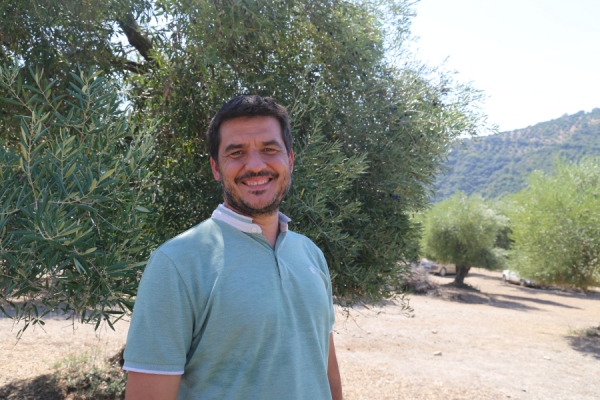Agricultural soils sustain life by producing food, but they also play an essential role in climate change, functioning as carbon sinks, storing large quantities of carbon and reducing its concentration in the atmosphere. Carbon is the main indicator of soils’ fertility, so an increase in the concentration of this element means more nutrients and cleaner air.
Mediterranean olive groves feature high erosion rates due to a perfect storm: a climate with episodes of intense rainfall, the orography of many mountain olive groves, with steep slopes; and conventional tillage, which leaves the soil bare, leading to runoff, soil creep, and, with it, losses of the organic carbon associated with sediment.
With the aim of determining whether ground cover (sowing vegetation in olive grove rows, so as not to leave the soil bare) is a good strategy to avert the loss of organic carbon in soil due to erosion, a team coordinated by Francisco Márquez, a researcher with the AGR 126 "Mechanization and Rural Technology" research group at the UCO, analyzed, for four years, the effects of ground cover on the loss of organic carbon in soil compared to the use of conventional tillage.
"We studied the main olive-growing areas of Andalusia, with 8 plantations in the main olive-growing regions, with diverse soils, different types of olive groves (traditional, mountain and intensive), and with almost all types of ground cover, to also gauge the influence of these factors on carbon loss," explained Francisco Márquez. "We concluded that ground cover not only reduces erosion and runoff, but also losses of organic carbon in soil, by three quarters compared to tillage."
The data of the study, in which UCO researchers Adolfo Peña, Antonio Hayas and Emilio González; and IFAPA researcher Rafaela Ordoñez, also worked, reveal that ground cover in Mediterranean olive groves reduces runoff by 37.6%, and erosion by 85.6%, also slowing the loss of carbon by 76.4%. Thanks to conservative management, the olive groves’ soil was 65.7% protected against rainfall on average over the course of each season, while with tillage soil protection dropped to 22.4%, on average.
Ground cover increases soils’ carbon concentrations fourfold and fivefold, compared to tilled soil, and carbon loss is lessened because cover drastically reduces erosion and improves the structure and cohesion of soil particles.
A notable finding of the study is how management systems are the main factor in controlling organic carbon loss in soils. The researcher explained: "The loss of soil and carbon depends on very specific factors, such as rainfall intensity. But, when we look at ground cover, we see that the loss of organic carbon in soil no longer depends on the intensity and characteristics of the rain, unlike with tillage, where the type of rain continues to mean more erosion and, with it, more carbon loss." This occurred in all the types of olive groves and cover types analyzed.
This work, then, supports the use of ground cover to move towards healthier, more sustainable and profitable olive groves, ones functioning as carbon sinks. Soils with higher carbon concentrations have better structures, favoring the absorption of water and nutrients by plants, and making them more productive. They are also important resources in the fight against climate change, decontaminating the air by converting soil into carbon sinks, preventing it from being lost and ending up polluting water or the atmosphere.
Reference
F. Márquez-García, A. Hayas, A. Peña, R. Ordóñez-Fernández, E.J. González-Sánchez, Influence of cover crops and tillage on organic carbon loss in Mediterranean olive orchards, Soil and Tillage Research, Vol 235, 2024, 105905, ISSN 0167-1987, https://doi.org/10.1016/j.still.2023.105905


